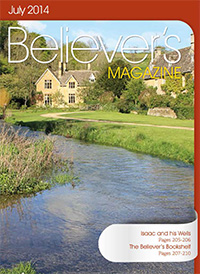Please note: although titles with an asterisk are specially recommended, the most important volume in the Christian's library is the Bible. All other books, however highly esteemed or recommended, must be checked against the one infallible book.
A number of these titles are either out of print or difficult to obtain. The Ritchie staff will be happy to assist, where possible, in sourcing these titles, but please be aware that at times this can be an extended process.
The Puritans were devout and often very learned men of the 16th and 17th century who left a remarkable body of expository and devotional writing. As their style ranges from the expansively prolix to the cryptically terse, they are not for easy reading. Though we would disagree with their ecclesiology and eschatology – like their contemporaries, they regularly confused Israel, the kingdom, and the church – they still have much to offer in their shrewd understanding of Christian experience.
William Bridge A Lifting up for the Downcast, Banner of Truth, 1961 (a series of sermons on Psalm 42.11 preached in 1648)
*John Bunyan The Pilgrim's Progress (the most famous and gripping of puritan writings and packed with practical encouragement)
John Bunyan Grace Abounding (the author's fascinating conversion story and spiritual autobiography)
*Jeremiah Burroughs The Rare Jewel of Christian Contentment, 1648, Banner of Truth, 1964 (expanded studies of Philippians 4.11 which will make us think twice before we grumble)
William Gurnall The Christian in Complete Armour, 1662, Banner of Truth, 1964 (sermons on Ephesians 6, expounding in depth the biblical imagery of the believer's warfare)
Joseph Hall Contemplations on the Historical Passages of the Old and New Testaments, 3 vols, Soli Deo Gloria, 1995 (Bishop of Norwich in 1641, Hall writes in a pithy and memorable way, drawing out practical and devotional thoughts from biblical narratives)
Samuel Rutherford Letters 1664, Banner of Truth, 1984 (samples of Rutherford's warm pastoral care and spiritual insight)
*Hamilton Smith (ed) Gleanings from Thomas Watson, 1915, reprinted Soli Deo Gloria, 1995 (a brief collection of excellent snippets from Watson)
*I D E Thomas (ed) The Golden Treasury of Puritan Quotations, Moody Press, 1975 (although there have been many similar anthologies, this is the best, with quotations catalogued under topical headings)
Thomas Watson A Body of Divinity; The Ten Commandments; The Lord's Prayer (these three volumes from 1660, all reprinted by Banner of Truth, constitute an exposition of the Westminster Shorter Catechism packed with incisive and memorable spiritual comments)
Because much of the Old Testament is Hebrew verse, all believers should have something of a taste for poetry. Most of the poetry mentioned below is available in many editions as well as being easily accessible online.
*William Cowper Collected Poems (a believer with a sensitive spirit and a strong sense of God's sovereignty who wrote with affection about the natural world he so much loved. See especially The Task)
George Herbert The Temple (a collection of lyric poems covering the varying stages of the Christian life. Try, as a taster, 'Love 3')
John Milton Paradise Lost (an astonishingly powerful if flawed attempt to turn the story of the Fall into epic poetry)
*John Newton The Olney Hymns (jointly authored by Newton and Cowper and published in 1775, the collection includes many hymns which usefully meditate on scriptural passages)
G H S Price (ed) A Selection of Poems, Stow Hill, 1953 (a rich compilation of verse by 'brethren')
Those who enjoy hymns will relish the collections by Joseph Hart, Thomas Kelly, Charles Wesley, and Isaac Watts. Assembly writers also produced some fine poetry, such as J N Darby's Spiritual Songs, J G Deck's Hymns and Sacred Poems, Edward Denny's Hymns and Poems, Centra Thompson's Songs of Praise.









